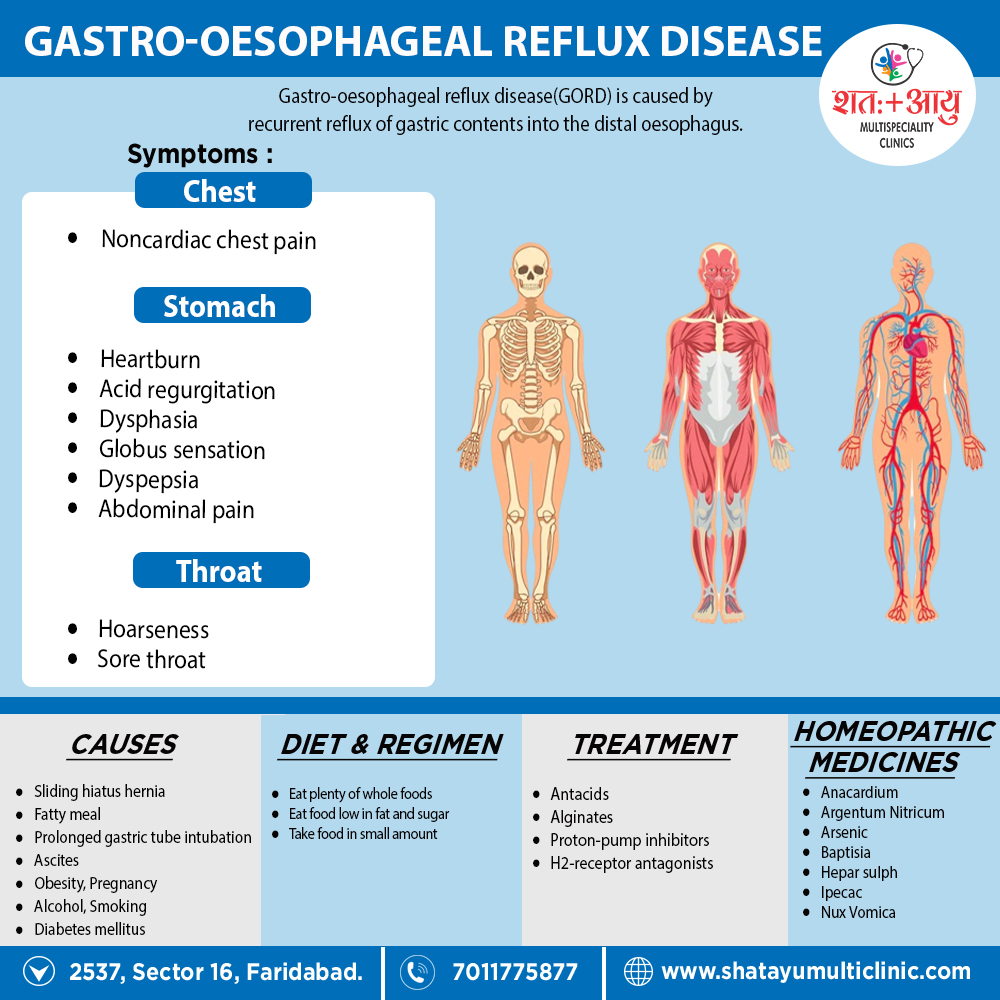Definition of Gastro-esophageal reflux disease:
Gastro-esophageal reflux disease (GERD) is caused by recurrent reflux of gastric contents into the distal esophagus.[1]

Gastro-esophageal reflux disease (GERD) is caused by recurrent reflux of gastric contents into the distal esophagus.[1]
Motility disorders of the distal esophagus (e.g. reduced peristaltic amplitude, decreased velocity and increased duration of peristaltic contractions) cause prolonged exposure of the esophagus to refluxed gastric contents.[1]
Factors which facilitate reflux are i.e.
The pathophysiology is multifactorial, but dysfunction of the lower esophageal sphincter (LOS) has a primary role. [1]
During swallowing i.e.-
Your Doctor will often be able to diagnose gastro-esophageal reflux disease (GERD) based on your symptoms.
They may prescribe medication to treat it without needing to carry out any tests.
Tests you may have i.e.:
Heartburn and gastro-esophageal reflux disease (in other words; GERD) can often be treated with self-help measures and over-the-counter medicines.
If these don’t help, your GP can prescribe stronger medication or refer you to a specialist to discuss whether surgery may be an option.
You may find the following measures can help reduce heartburn and other symptoms of GERD:
If you’re taking medication for other health conditions, check with your GP to find out whether they could be contributing to your symptoms.
Different medicines may be available, but don’t stop taking any prescribed medication without consulting your doctor first.[1]
A number of different medications can be used to treat symptoms of GERD.
Over-the-counter heartburn and GERD medicines are available from pharmacies without a prescription. The main types are:
Surgery may be an option if:
The main procedure used is called a laparoscopic Nissen fundoplication (in other words; LNF). Alternative techniques have been developed more recently, although these aren’t yet widely available. [1]
Homeopathy treats the person as a whole. It means that homeopathic treatment focuses on the patient as a person, as well as his pathological condition. The homeopathic medicines selected after a full individualizing examination and case-analysis.
which includes
A miasmatic tendency (predisposition/susceptibility) also often taken into account for the treatment of chronic conditions.
A homeopathy doctor tries to treat more than just the presenting symptoms. The focus is usually on what caused the disease condition? Why ‘this patient’ is sick ‘this way’?.
The disease diagnosis is important but in homeopathy, the cause of disease not just probed to the level of bacteria and viruses. Other factors like mental, emotional and physical stress that could predispose a person to illness also looked for. No a days, even modern medicine also considers a large number of diseases as psychosomatic. The correct homeopathy remedy tries to correct this disease predisposition.
The focus is not on curing the disease but to cure the person who is sick, to restore the health. If a disease pathology not very advanced, homeopathy remedies do give a hope for cure but even in incurable cases, the quality of life can greatly improved with homeopathic medicines.
The homeopathic remedies (medicines) given below indicate the therapeutic affinity but this is not a complete and definite guide to the homeopathy treatment of this condition. The symptoms listed against each homeopathic remedy may not be directly related to this disease because in homeopathy general symptoms and constitutional indications also taken into account for selecting a remedy.
Homeopathy treats the person as a whole. It means that homeopathic treatment focuses on the patient as a person, as well as his pathological condition. The homeopathic medicines are selected after a full individualizing examination and case-analysis, which includes the medical history of the patient, physical and mental constitution, family history, presenting symptoms, underlying pathology, possible causative factors etc.
A miasmatic tendency (predisposition/susceptibility) is also often taken into account for the treatment of chronic conditions. A homeopathy doctor tries to treat more than just the presenting symptoms. The focus is usually on what caused the disease condition? Why ‘this patient’ is sick ‘this way’. The disease diagnosis is important but in homeopathy, the cause of disease is not just probed to the level of bacteria and viruses. Other factors like mental, emotional and physical stress that could predispose a person to illness are also looked for.
No a days, even modern medicine also considers a large number of diseases as psychosomatic. The correct homeopathy remedy tries to correct this disease predisposition. The focus is not on curing the disease but to cure the person who is sick, to restore the health. If a disease pathology is not very advanced, homeopathy remedies do give a hope for cure but even in incurable cases, the quality of life can be greatly improved with homeopathic medicines.
The homeopathic remedies (medicines) given below indicate the therapeutic affinity but this is not a complete and definite guide to the homeopathy treatment of this condition. The symptoms listed against each homeopathic remedy may not be directly related to this disease because in homeopathy general symptoms and constitutional indications are also taken into account for selecting a remedy.
Gastro-esophageal reflux disease (GERD) is caused by recurrent reflux of gastric contents into the distal esophagus.
References